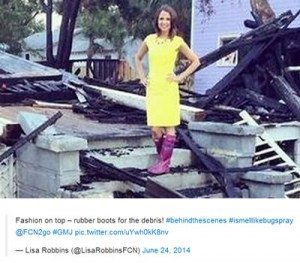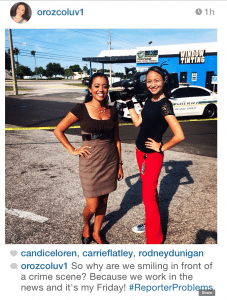A television station runs a photo of the mayor and wrongly states she’s flashing a gang sign.
TV reporters share photos of themselves on social media appearing to make light of serious stories.
Two Chicago stations can’t get the facts right on a jail sentence.
What a year for journalism ethics. Ironic, don’t you think, that so may screw-ups happened just as the Society of Professional Journalists was rewriting its ethics code to make it more relevant in a multimedia world? As it happens, I was also focused on ethics this year as a visiting professor at the University of Arkansas and dare I say there was no shortage of material for class discussions.
Let’s start the recap with #Pointergate, the now-infamous story by KSTP in Minneapolis.
Why would Mayor Hodges flash gang signs with 2x convicted felon? Find out why police are fuming in ten minutes on 5 at ten.
— Jay Kolls (@JayKollsKSTP) November 7, 2014
The station took a boatload of criticism for going ahead with the story after the mayor’s office told them she and the man were just pointing at each other while on a get-out-the-vote drive. In its defense, KSTP said it was “alerted to the photo” by law enforcement officials concerned that the mayor was soft on gangs. Seems to me that’s a telling admission that the station was actually being used in a dispute between the mayor and police, stepping over an ethical line by compromising its independence.
In the “what were they thinking” department, several TV reporters made fools of themselves on social media in a misguided effort to share behind-the-scenes tidbits with their audience.
Reporter Jackie Orozco of Fox35 in Orlando, Florida, posted a photo of herself on Instagram with the caption, “So why are we smiling in front of a crime scene? Because we work in news and it’s my Friday!” When the critics let her have it, she deleted her account and apologized on Twitter for a post that was “insensitive and in poor taste.”
Lisa Robbins of First Coast News in Jacksonville, Florida, also stepped in it on social media (Florida, again?) with a tweet from an a rson scene. “Fashion on top — rubber boots for the debris,” she tweeted, and added the hashtag #smelllikebugspray.
rson scene. “Fashion on top — rubber boots for the debris,” she tweeted, and added the hashtag #smelllikebugspray.
Here’s a suggestion for 2015. How about thinking before posting? Just ask yourself, if this awful thing had happened to my family, how would I feel about this tweet? If the answer is “sad and angry,” please keep that photo to yourself.
And speaking of thinking before posting…let’s all agree that being first and wrong is not a desirable outcome. Two Chicago TV stations learned that the hard way this year when they rushed to report breaking news. A judge had sentenced a woman to 5 years in prison for reckless homicide and 4 years in prison for aggravated DUI, with the sentences to be served concurrently.
WMAQ posted the story first:
First, and wrong. But WGN didn’t do any better.
Journalists are notorious for their poor math skills, of course, but they’re supposed to know the meaning of words. I guess the definition of “concurrently” wasn’t on the vocab list, or the stations would have correctly reported the woman would serve a total of 5 years.
And there’s more. On Facebook, journalists in Florida dissed a Republican candidate who won election for attorney general. “Ugh,” said one. “Gross,” said another. Impartiality, anyone?
A Baltimore TV station had to apologize for an audio edit that misled viewers into thinking protesters were chanting “kill a cop” when they were actually saying “’til killer cops are in cell blocks.” “Honest misunderstanding,” WBFF said in a statement. Critics thought otherwise, noting the station is owned by the politically conservative Sinclair Broadcast Group. (Update: The station later fired the reporter and photojournalist who produced the story, according to sources.)
In Alaska, a reporter quit on air (the famous “F–k it” resignation) after reporting a story about a cannabis business she owns. Turns out, she’d done a whole series on medical marijuana earlier in the year that drew complaints of bias, but the station claimed it had no clue about her conflict of interest until she divulged it the day she quit.
Plenty of other cases could have made the list, from the coverage of Ferguson to the Malaysian plane crash, but we’ll leave it there.
Here’s hoping 2015 doesn’t provide quite as much fodder for journalism ethics discussions.












3 Comments
[…] Gang signs, profane on-air resignations, crime scene selfies, and sloppy breaking news Twitter. Local stations from Florida to Alaska and back to Florida–of course–are among the candidates for NewsLab’s “Screw-Ups of the Year” competition. And the polls are open. […]
Actually it is a sad commentary on the state of journalism, more sad than funny.